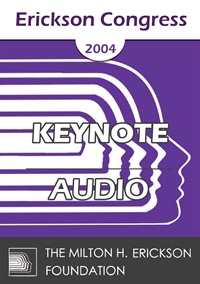
- Average Rating:
- Not yet rated
- Topic Areas:
- Keynotes | Meditation, Spirituality and Yoga | Milton Erickson | Psychotherapy | Therapist Development | Social Issues
- Categories:
- Erickson Congress | Erickson Congress 2004
- Faculty:
- Cloe Madanes, HDL, LIC
- Duration:
- 53:36
- Format:
- Audio Only
- Original Program Date:
- Dec 02, 2004
- Short Description:
- From Freud to Erickson to the current practice of psychotherapy, the nature of human problems has remained the same. What has changed is which problems we consider are within the realm of psychotherapy to elucidate. When Erickson introduced the concept of directive therapy, the field changed, not only in terms of how to do therapy, but also in terms of what are the issues a therapist must address. Is there a place for the concept of evil, for the practice of justice, and for the spiritual realm in therapy? What do we know today that we didn't know a hundred years ago? How can we preserve the existence of the therapist as humanist, social activist and systemic thinker?
- Price:
- $15.00 - Base Price
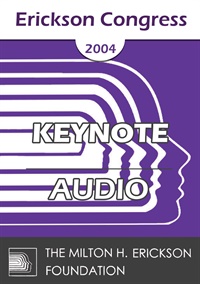
- Average Rating:
- Not yet rated
- Topic Areas:
- Keynotes | Hypnosis | Therapist Development
- Categories:
- Erickson Congress | Erickson Congress 2004
- Faculty:
- Jeffrey Zeig, PhD
- Duration:
- 58:49
- Format:
- Audio Only
- Original Program Date:
- Dec 05, 2004
- Short Description:
- Hypnosis is commonly thought of as a tool to enhance the therapy. It also can be used as a "lens." The phenomenology of hypnosis can help us to understand an essential aspect of the trance state, the symptom state, the solution state and the therapist's state, thereby providing new options for treatment.
- Price:
- $15.00 - Base Price
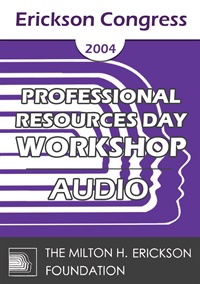
- Average Rating:
- Not yet rated
- Topic Areas:
- Workshops | Interviewing | Therapist Development | Experiential Therapy
- Categories:
- Erickson Congress | Erickson Congress 2004
- Faculty:
- Steve De Shazer, MSSW
- Duration:
- 1:40:27
- Format:
- Audio Only
- Original Program Date:
- Dec 01, 2004
- Short Description:
- This workshop is an experiential session designed to compare and contrast views of self with the view of self as compared by others in a therapeutic interview.
- Price:
- $15.00 - Base Price

- Average Rating:
- Not yet rated
- Topic Areas:
- Workshops | Therapist Development
- Categories:
- Erickson Congress | Erickson Congress 2004
- Faculty:
- Teresa Robles, MA, PhD | Marilia Baker, MSW
- Duration:
- 1:50:39
- Format:
- Audio Only
- Original Program Date:
- Dec 01, 2004
- Short Description:
- In this workshop, the presenters will offer a dual vision of the axis of the impressive growth of the Centro Ericksoniano de Mexico and its multiple achievements and the role of the founding director as the leader and the consultant as the mirror. Participants will experience and practice two exercises on the art of collaboration and sharing.
- Price:
- $15.00 - Base Price
Tags: Therapist Development

- Average Rating:
- Not yet rated
- Topic Areas:
- Workshops | Therapist Development
- Categories:
- Erickson Congress | Erickson Congress 2004
- Faculty:
- Steve Andreas, MA, NLP
- Duration:
- 2:01:27
- Format:
- Audio Only
- Original Program Date:
- Dec 01, 2004
- Short Description:
- The biggest obstacle to the further development of a therapist's skills is arrogance and pride; a heavy burden and one of the seven deadly sins. Self-importance or "ego" actually results from uncertainty and doubt about the self. Learn how to heal this personal incongruence, become more effective and rejoin humanity.
- Price:
- $15.00 - Base Price

- Average Rating:
- Not yet rated
- Topic Areas:
- Workshops | Therapist Development
- Categories:
- Erickson Congress | Erickson Congress 2004
- Faculty:
- Jeffrey Zeig, PhD
- Duration:
- 2:04:48
- Format:
- Audio Only
- Original Program Date:
- Dec 01, 2004
- Short Description:
- This program will cover the mechanics of workshop organization and promotion, and include ideas about increasing teaching effectiveness using Ericksonian principles.
- Price:
- $15.00 - Base Price
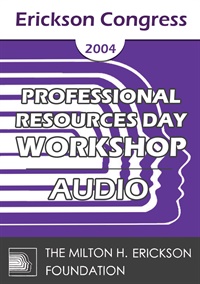
- Average Rating:
- Not yet rated
- Topic Areas:
- Workshops | Therapist Development | Self-Care
- Categories:
- Erickson Congress | Erickson Congress 2004
- Faculty:
- Stephen Lankton, MSW | Kathleen Donaghy
- Duration:
- 1:40:55
- Format:
- Audio Only
- Original Program Date:
- Dec 01, 2004
- Short Description:
- This workshop leads participants in exercises which will unravel the cognitive-emotional mechanism of self-sabotage. The focus is aimed at strengthening participants' automatic associations to resources even in times of low motivation and self-imposed excuses to avoid success.
- Price:
- $15.00 - Base Price
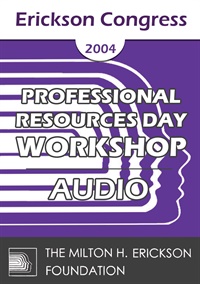
- Average Rating:
- Not yet rated
- Topic Areas:
- Workshops | Hypnosis | Naturalistic | Therapist Development
- Categories:
- Erickson Congress | Erickson Congress 2004
- Faculty:
- Camillo Loriedo, MD, PhD
- Duration:
- 2:01:56
- Format:
- Audio Only
- Original Program Date:
- Dec 01, 2004
- Short Description:
- In naturalistic hypnosis, the therapist's resources are essential for effective therapy. The way in which the therapist establishes rapport, using minimal cues, generally induces deeper, more durable changes than complex and sophisticated techniques. The therapist's emotions and isomorphic behaviors provide tools for accessing immediate diagnosis and therapeutic change.
- Price:
- $15.00 - Base Price
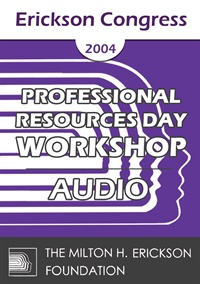
- Average Rating:
- Not yet rated
- Topic Areas:
- Workshops | Meditation, Spirituality and Yoga | Therapist Development | Pain and Healing
- Categories:
- Erickson Congress | Erickson Congress 2004
- Faculty:
- Joyce Mills, PhD, LMFT
- Duration:
- 1:22:35
- Format:
- Audio Only
- Original Program Date:
- Dec 01, 2004
- Short Description:
- How do we take care of ourselves as therapists? That question is at the center-point of this experiential workshop. Participants will be provided with five pathways for how they can reconnect to the magic in their own lives: 1) Renewal from the Roots Up; 2) Lessons Learned from the Natural World; 3) Restoring the Breath of Life; 4) Rituals for Remembering; 5) Giveaway: Sharing the Vision.
- Price:
- $15.00 - Base Price
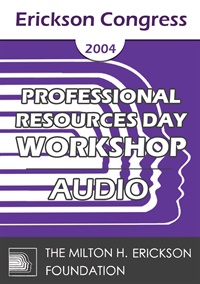
- Average Rating:
- Not yet rated
- Topic Areas:
- Workshops | Improvisation | Therapist Development | Art and Creativity
- Categories:
- Erickson Congress | Erickson Congress 2004
- Faculty:
- Robert Schwarz, PsyD
- Duration:
- 1:32:01
- Format:
- Audio Only
- Original Program Date:
- Dec 01, 2004
- Short Description:
- Increase your ability to improvise and think creatively on the spot. Rejuvenate your ability to find the humor and imaginative spark in all types of situations. In this almost totally FUN and experiential workshop participants will learn a variety of exercises from improvisational comedy and acting that will stimulate their own consciousness of inventiveness. A great way to supercharge yourself for the rest of the Congress.
- Price:
- $15.00 - Base Price
Please wait ...

